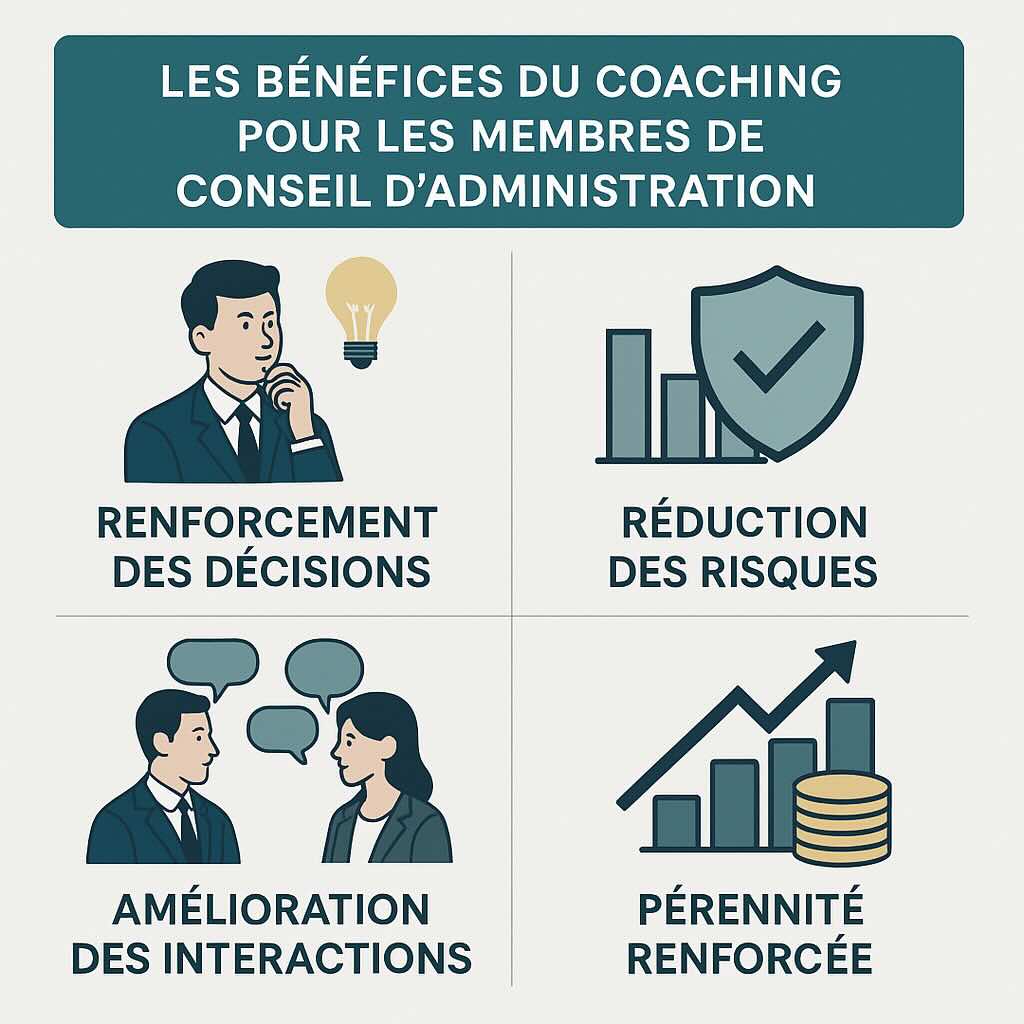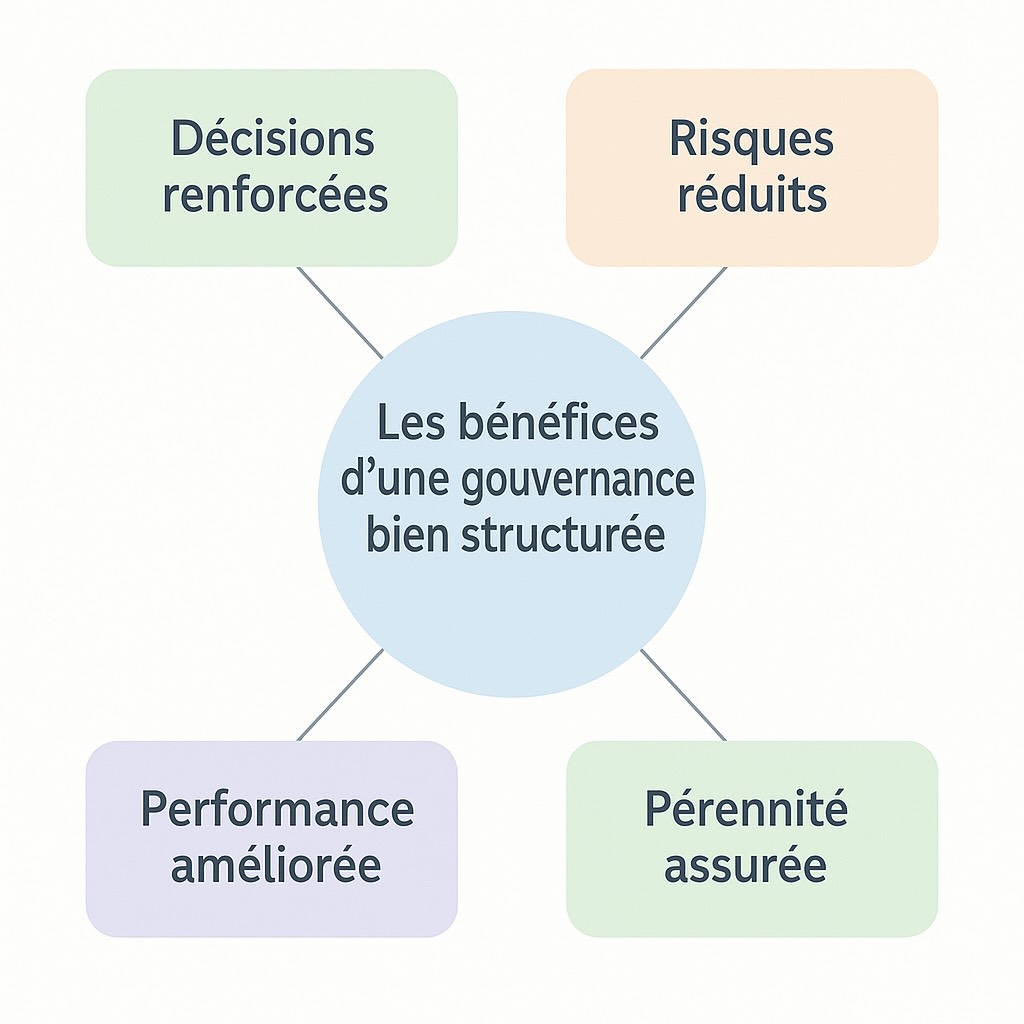An emerging practice, a growing requirement
In an increasingly regulated environment, the role of directors is becoming more demanding. Boards must combine strategy, control, ethics and performance. Faced with this complexity, directors are looking for outside resources to strengthen their posture. Personalized coaching meets this need. It provides structuring support over the long term or in an emergency.
A specialized coach in corporate governance offers invaluable support. Independent, he or she belongs neither to the company nor to the board. He or she provides a neutral viewpoint, with no personal stakes. The director can thus express himself or herself freely, reflect calmly, and decide with discernment. This support offers a confidential space, free from internal influences.
Governance coaching is still little-known. Yet its benefits are numerous. This is a strategic service. It helps directors to better understand their responsibilities, and promotes the long-term viability of the company. It also supports the quality of deliberations and the cohesion of the Board.
Coaching and governance: a particular speciality
Executive coaching is not like mentoring or legal advice. The coach doesn't dictate. He doesn't decide. He questions, supports, opens perspectives. He helps you to think differently. He builds an alliance in which neutrality is essential.
See our article on Family business Coaching
This discipline requires a dual expertise. Firstly, in-depth knowledge of boards of directors: how they operate, their dynamics, their legal obligations. Secondly, mastery of professional coaching techniques: active listening, strategic questioning, managing silences. Few experts in Switzerland have these skills.
The coach stays neutral. He does not take sides in internal debates. He observes, questions and rephrases. He ensures that the director makes decisions clearly and responsibly. He does not influence, but rather catalyzes personal reflection.
Customized support
Every coaching session begins with a meeting. Define your needs and objectives. Is it one-off support or long-term assistance? The director expresses his or her expectations. The coach listens. Together, they set the framework. A written charter can formalize the relationship.
Sessions are confidential. What's important is regularity and trust. The pace must respect the client's responsibilities and governance schedule.
The coach asks precise questions. He helps to formulate doubts. He facilitates access to internal solutions. He guides without imposing. His objective: to develop the manager's autonomy and lucidity. He offers decision-making tools and guidance in grey areas.
Crisis or long-term Coaching : two logics
Occasional coaching is used during a crisis. An urgent decision, external pressure, internal instability. The coach supports the director in this critical period. He helps him manage stress, prioritize issues and take a stand. He acts as a temporary stabilizer.
Long-term coaching , on the other hand, enables deeper progress. The director strengthens his posture, clarifies his values and refines his judgment. The coach becomes a sparring partner, a demanding but benevolent mirror. He accompanies the key stages of a mandate, such as a strategic re-evaluation or a managerial transition .
These two forms are not mutually exclusive. They respond to different needs. Sometimes, one-off support can pave the way for a long-term relationship. A visionary board may even propose a dedicated budget for such support, for the collective benefit.
All concerned: shareholders, self-employed, young or experienced
Coaching is suitable for all profiles. The shareholder director finds a space in which to distinguish his personal interests from the general interest. The coach helps him to arbitrate with integrity. He helps him to prioritize his mandates, to reconcile his loyalty to the company with his own financial interests.
For the independent professional director (IPD), coaching offers essential support. He has a major responsibility: to ensure the long-term future of the company, while defending the interests of shareholders. A complex balance, often underestimated. The coach helps him stay on course, even in the storm.
The coach also assists young directors. Those taking up their first mandate. Those who are still hesitating. He gives them confidence, without formatting them. He encourages them to adopt an authentic posture , in line with their values.
See Our board coaching services
Legal framework: the need for vigilance
Coaching involves access to sensitive information. The director cannot share this data without authorization. He must obtain formal approval from the board. This principle protects both the company and the coach.
This framework preserves legality. It avoids conflicts of interest. The coach often signs a confidentiality agreement. The board can also define clear rules governing coaching. This can be as simple as an agenda item or a memo providing a framework for the collaboration.
Compliance with Swiss company law is fundamental. The coach remains an outsider, with no decision-making power. He must never appear as an influential third party. The coach 's posture is based on discretion and strict compliance with the mandate.
A demanding code of ethics
The coach abides by strict rules. Confidentiality, respect for the customer, professional responsibility. He does not manipulate. He does not guide decisions. He sets an ethical framework. He shows humility and recognizes his own limits.
Several standards exist: ICF, EMCC, IAC. All insist on the coach's posture . The coach must take a back seat to his client's development. He must remain vigilant to influence games, projection and cognitive bias.
Good coaching starts with a contract. This contract sets limits, anticipates conflicts of interest and ensures transparency. The director remains in control. He can terminate the mandate at any time. The coach, on the other hand, must regularly assess the relevance of his or her posture.
The ideal profile of an executive coach
Above all, an executive coach needs to be experienced and mature. He or she is familiar with the realities of boards of directors, the dynamics of power and the stakes of responsibility. He or she has sat on or supported boards in a variety of contexts.
His background includes solid training in professional coaching . He masters the tools, ethical guidelines and limits of his role. He knows how to listen without judging, question without directing, confront without offending. He cultivates a low-key posture but great inner clarity.
He also possesses systemic intelligence. He understands the interactions between governance, strategy, finance, risk and corporate culture. He picks up on weak signals, inconsistencies and underlying tensions. He accompanies with finesse and discernment.
Finally, he remains humble. He doesn't try to shine, nor does he try to substitute himself for the role of the Board. He recognizes the director's dilemmas and helps him to develop his own posture. In so doing, he helps to raise the overall standard of corporate governance.
Group Coaching of a board: an efficient and structuring approach
In addition to individual support, a coach can also work with all the members of the same board of directors. This collective approach offers a space for shared reflection, away from the usual tensions of statutory meetings.
This approach is often triggered by the Chairman of the Board of Directors, or by shareholders who wish to give this body a different performance dynamic: See The Chairman's role in board effectiveness
Group coaching aims to strengthen group dynamics. It builds trust, improves interaction and clarifies roles. The coach acts as a neutral mediator, guaranteeing the framework and confidentiality. He enables the board to work on its common posture culture and operating methods.
This approach is particularly appropriate during periods of transformation, the arrival of new members, or internal tensions. It can also form part of a continuous improvement program, in the same way as a regular board evaluation.
To be effective, collective coaching must be accepted by all board members, and each of them must have a clear understanding of the objective to be achieved.
A lever for governance maturity
Board coaching improves the quality of decisions. It reduces risk. It fosters a culture of dialogue, discernment and responsibility. It defuses tensions before they become open conflicts.
Boards that accept this practice are gaining in maturity. Directors take a step back. They anticipate better. They communicate with greater impact. They know how to set limits, delegate and build balanced governance.
In an increasingly complex environment, coaching is becoming an asset. Not a luxury. A strategic choice, in line with modern governance requirements. A reflection of a lucid, ethical and responsible corporate culture.
If you'd like to find out more, or to see whether coaching might be right for you, please don't hesitate to contact me for an initial discussion: Eric Maire - Governance Expert, independent professional director, trainer and director coach .
For further information, please also contact : Fabienne Revillard
Would you like to find out more? You may also be interested in these articles:
How to support a company in difficulty?
How to make your board more effective?
Team Coaching - How can you empower your teams?
What if a professional Coach could help me?
Discover also AAA+ Coaching et Formation on Facebook and LinkedIn
Are you looking for tips for successful career progression?
Sign up at newsletter and receive our offers and tips for better professional development.






